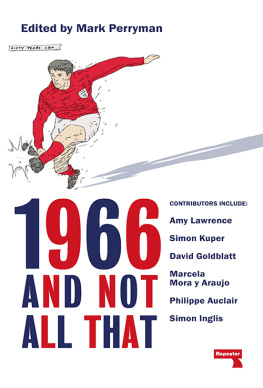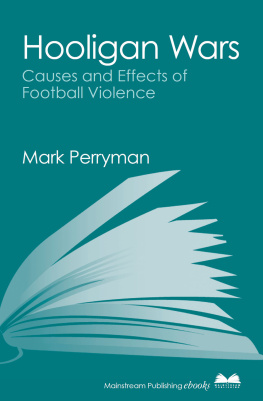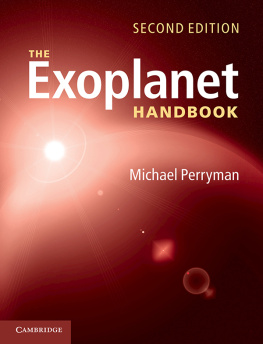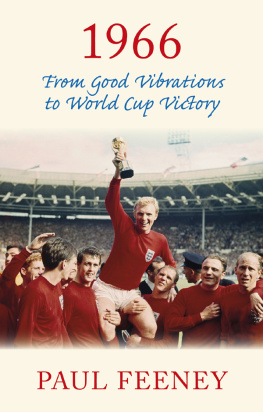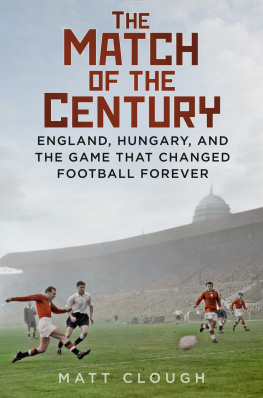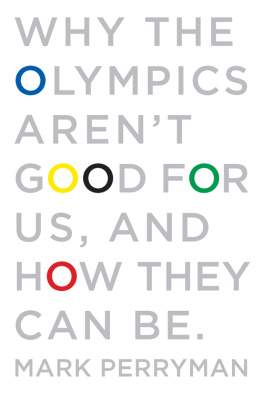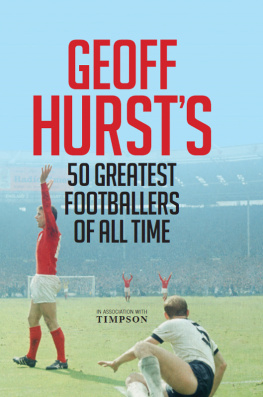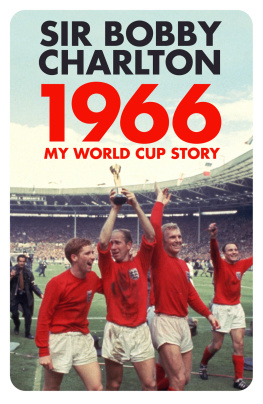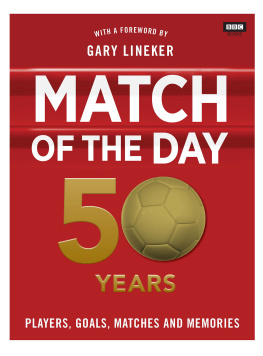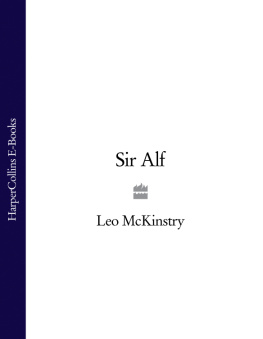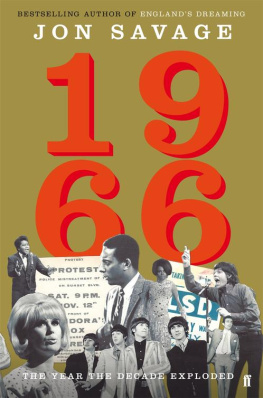
1966
AND NOT
ALL THAT
Edited by
Mark Perryman

For the Kingswood, Walton
and Tadworth Summer Flower Show 23.07.66.
Proof positive of the all that of 1966.
Contents
Introduction
The Not All That
Mark Perryman
T HE OFFICIAL FILM OF 1966, Goal! with commentary by Brian Glanville and narration by actor Nigel Patrick is a linear, not entirely uncritical, cinematographic portrait of a singularly special three and a bit weeks of English football. The ambition of 1966 and Not All That is for the first time in fifty years to try to do something similar on the printed page.
The title is adapted from the irreverent and much-loved history of England, 1066 and All That by W.C. Sellar and R.J. Yeatman, who described it as a Memorable History of England, comprising all the parts you can remember, including 103 Good Things, 5 Bad Kings and 2 Genuine Dates. Published in 1930, its spirit survives via the childrens TV favourite Horrible Histories. Our history of 1966 is irreverent too, but never disrespectful. Whatever the changed circumstance of world, and English, football from then to now, for any country to win the World Cup remains a remarkable achievement. And in early July 66, make no mistake, England were, as they remain since, World Cup quarter-finalists at best. 1966 therefore refers to the achievement, and Not All That refers to all that it has since been forced to represent, or as our writers largely argue, misrepresent.
The book opens pre-match, quite rightly, with the voices of those who were there to see England make it happen. For the first time an oral history, a peoples history, of the 1966 tournament, expertly compiled by Amy Lawrence. And to provide a half-century of context, Mark Perrymans chapter reviews all that has followed, on and sometimes off the pitch.
Our writing styles mix the reflective and analytical with real-time reportage. Asif Burhan and Joe Kennedy provide a 1966 tournament guide written as if they were there in 66 in actual fact neither were even born then but in a way that readers of modern World Cup handbooks would be familiar with. Well-informed broadsheet digests of key facts mixed with fanzine-type satire.
As kick-off approaches, football historian John Williams surveys the state of English football in the mid-1960s. Cultural historian Richard Weight does the same for the rest of the country beyond the touchline. Alan Tomlinson reports from the final as a teenage fan, while reflecting fifty years later on how the tournament was organised, with all that he has learned as one of the worlds leading experts on the politics of FIFA . German football writer Claus Melchior reminds English readers that despite Englands failings at previous World Cups the West Germany team in 1966 were very much the underdogs.
One very particular approach to 66 that this book has adopted is to provide space for the other. To this end each of Englands games, from group stage to the final, is reported on by a writer of the opposition nation. Once more this is in real-time style, complete with how their team came to England, what they made of the nation and team, and what happened to them next. A Mexican, a Uruguayan, a Frenchman, an Argentine, a Portuguese and a German: sounds like the line-up for a poor-taste joke, but in our book it provides an international range of highly innovative writing to turn the familiar into the unfamiliar. Do they mean us?
The first half is time to drill down into the detail of how the tournament was played, and consumed. Writer on stadia architecture Simon Inglis recalls the state of the venues, some gone, some rebuilt, some much as they then were. Sportswriter and lecturer in sports journalism Rob Steen revisits the ways in which the tournament was covered by the media. Simon Kuper, co-author of the book Why England Lose, explains Why England Won. Literary historian Claire Westall unpicks the meaning behind the near industrial production of 1966 nostalgia.
Our second half provides a bout of much-needed reflection. Acclaimed critic of the modern game David Goldblatt answers some vital questions on whatever happened to football in the past fifty years. Sociologist Mark Doidge compares the English and German models for organising their football. For a wider view on a very English hang-up on the longevity of years of hurt, Scottish political commentator Gerry Hassan and German sportswriter Markus Hesselmann provide their perspectives.
In extra time cultural theorist and 66 World Cup spectator Steve Redhead argues for a dialectical approach if we are to truly appreciate the liberatory potential of football. Football travel writer Stuart Fuller celebrates his very own liberation from the limitations of the domestic game via a budget airline destination guide with fixture list at the ready. Nick Davidson, author of a history of cult German club FC St Pauli, explores how in both Germany and England fans are founding common cause against their modern and our modern football. Football Beyond Borders activist Sanna Qureshi looks beyond national identity politics to locate the subversive side of the game.
No penalty shoot-out in our book; that would be just too painful. Instead we go straight into post-match with a unique charting of World Cup achievements since 1966. Football statistician Philip Cornwall has done the numbers to produce a result that will have readers arguing the toss forever and a day.
Goal! was directed by the Turkish artist Abidine Dino and produced by the Chilean Octavio Seoret, with a distinctly un-English soundtrack of discordant, almost ambient jazz provided by John Hawksworth. Almost nothing is traditional or predictable about this film that famously ends with the Groundsman locking up after the final has ended, kicking the litter and debris off the steps, and Brian Glanvilles concluding words from his commentary: And at Wembley Mr McElroy locks up. Its taken fifty years to catch up with the whole meaning of what happened at Wembley on that day; isnt it time we did so?
Pre-Match
A Peoples History of 1966
Amy Lawrence
W ORLD CUPS CAN BE such profoundly formative things. As a football supporter, the scale and sense of history and every-four-years pattern (all the more thrilling for the wait) just seems to strike a chord that resonates outside the regular football experience.
I can still flash back in a heartbeat to big moments in my personal World Cup past. Watching Maradonas Hand of God in 1986 in the lounge at dads and trying to make sense of an injustice that was incomprehensible to a fourteen year-old who had never seen anything like it. In 1990, I set off by train with two friends, a sleeping bag and a couple of hundred quid for Genoa to spend a week at Italia 90, where the romance of Roger Milla and Toto Schillachi, and the glorious Italian hospitality, rendered us all spellbound. USA 94 bought a quandary whether to go as planned, or forgo attending that World Cup to take up the offer of an actual real job as a football journalist starting in the office immediately (quite the dilemma). By France 1998, I was an accredited member of the travelling press pack, so privileged to witness the drama of England-Argentina in St Etienne, Dennis Bergkamps wondergoal in Marseille, Croatia coming of age in Paris, and Zinedine Zidane earning the soubriquet of President during the final. Fast-forwarding to the most recent edition, in 2014, a pilgrimage to the Maracan for the first time took my breath clean away. I love World Cups, fully and unashamedly. Whether we can continue to love them in the same way as they travel under FIFA s peculiar direction remains to be seen. Ill try anyway.
Next page
